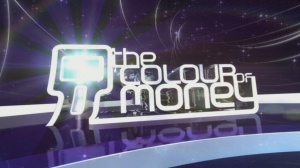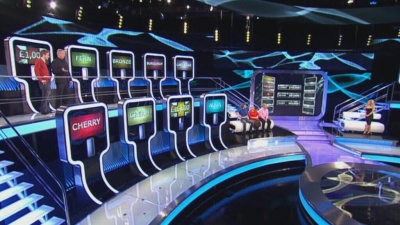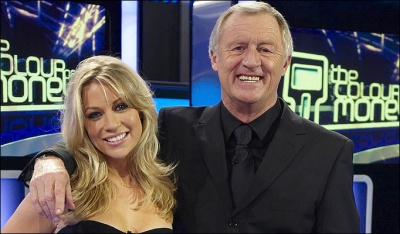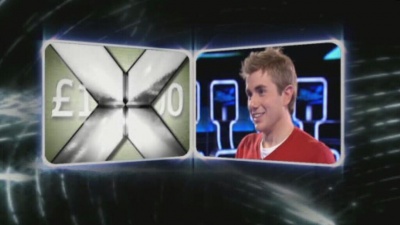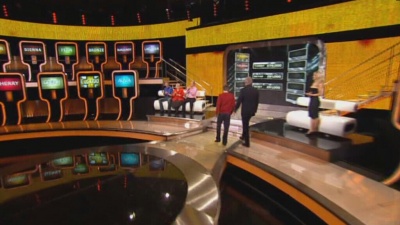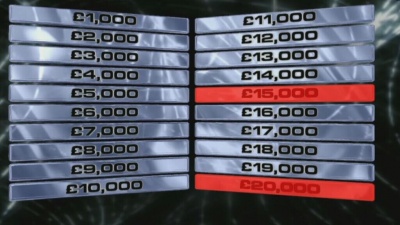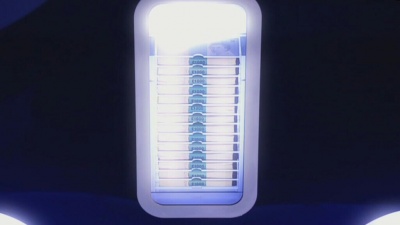The Colour of Money
UKGameshows (Talk | contribs) |
m (1 revision) |
Revision as of 13:18, 22 December 2009
Contents[hide] |
Host
Mark Durden-Smith (unaired pilot)
Co-hosts
Millie Clode
Voiceover: Jon Strickland
Broadcast
12 Yard for ITV1, 21st February to 11th April 2009 (7 programmes broadcast, at least 3 others believed unshown)
Synopsis
The Bong Game returns for 2009 and it's bigger and... well, it's bigger, by a factor of ten.
Like a hoodie from Greater Manchester, contestants get to grab money from ten cash machines in one night. There are 20 machines on offer, each one given a different colour - from the basic rainbow shades to more exotic offerings such as Claret and Khaki. This leads to contestants justifying a completely random choice on spurious reasons like "My dad's a fisherman, so it has to be Salmon" or "It's a Red alert time".
Upon selecting a machine, the entire studio changes to the relevant colour and Chris Tarrant, for it is he, walks over to the relevant machine while Sky Sports presentress Millie Clode (tarted up in too much black eye shadow and too little black dress) provides statistical information of the current situation.
Tarrant starts the machine counting in £1000 per second increments, and he then seems to go off and make a cup of tea. Meanwhile, the contestant has to shout "STOP!" before getting too greedy. You see, each of the 20 machines contains a different number of grand, and if you let the machine go over the amount it actually contains, a nasty noise is heard and a large X will appear on the screen.
While the machine counts up, the contestant will will invariably plead at the screen to be a "big one" while their cowardly family members tell them to stop at the earliest moment possible.
The aim of the game is to withdraw a pre-determined total - at least £50,000 - exactly from a maximum of ten machines, otherwise they leave with nothing. This rule has some unfortunate consequences. There are times when, to all intents and purposes, the contestant can technically win on the penultimate machine, meaning that the final stage of this Saturday night extravaganza ends up asking the contestant to count to 1 and shout stop. Mastermind it ain't.
The real thing that sticks in the craw is the unashamedly Fox-like pre-game hype, with slick packages of light spoilers, sob stories of why the contestants need the money and an explanation of the rules. Clearly, the format is aimed not so much to the ITV public but to the worldwide formats market as a whole. Chop off the last 40 minutes and you have your perfect 5-minute Americanised trailer, all wrapped up and ready for Mip. Sadly, this cheapens a game that is, to be fair, exciting at times and the most mathematically interesting since Deal or No Deal.
Where this format is found lacking compared to DoND is the lack of variance in the repeatability. The Banker has all kinds of comedy, drama and rule-bending at his disposal, and there is a real sense of journey. Unfortunately, TCoM just feels like ten identical rounds of throwing darts at a board while blindfold, and despite the reasonably slick presentation (using 32-bit lighting, dontcha know) being worthy of the timeslot, the game gets old real quick.
One thing they could have done to increase the tactical options has been recognised, but hasn't been implemented well. The game's main element of strategy lies in the fact that if, say, the £3k, £4k and £5k machines have already been revealed, you know that if you get past £2k safely the worst you could get from that machine is £6k. This is referred to as "playing the gaps" by Millie in her stats updates, but unfortunately the unseen values appear on a completely different screen to the cash machines, so it's nigh on impossible to play this strategy well, and impossible for the viewer to follow.
Another directorial mistake is in the use of real cash bundles of £1000, which are revealed from behind a frosted glass panel during the "prove out" stage of each machine. They could have been quite a useful way of showing that the game isn't rigged, but the bundles - which are hardly ever seen or referred to anyhow - float up and down in their slot without any seeming logic, making the endeavour somewhat pointless.
Two items of interest from the credits: the first is the list of six - yes, six - devisors, which probably works out at 0.8 rules per person. The other is the need for "Contestant Medicals" by a company called Preventicum; the next joke writes itself.
Thankfully, the British public voted with their remote controls and saw it for the overhyped tosh that it is. On some weeks it lost 75% of its lead in audience, with viewing figures lurching between 2 and 4 million - too low for an ITV Saturday night show that was "hammocked" between the ratings bankers that are Harry Hill and Ant 'N Dec. The final episode was pulled from the schedules, to be replaced by "Planet's Funniest Animals".
Inventor
Paul Brassey, Jim Cannon, Andy Culpin, Daniel Moody, Sam Pollard, David Young, Old Uncle Tom Cobley and all (join in if you know the words).
Trivia
It was originally pitched as a daytime show with a lower prize budget to match - and indeed, is sold abroad as such to some success - but the idea was "bigged up" by ITV and, it can be seen with hindsight, to the format's detriment.
Originally, Millie's role was played by a male statistician called Dave, but these programmes were never broadcast.

